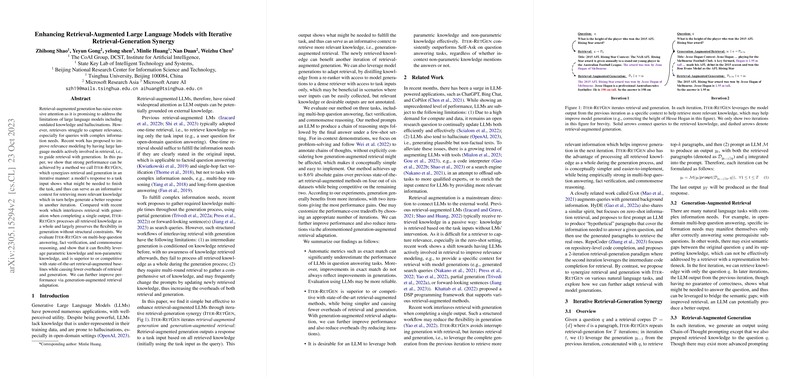Introduction
A new method, termed TER-RETGEN (Iterative Retrieval-Generation Synergy), has been introduced, offering a significant advance in retrieval-augmented LLMs. TER-RETGEN operates under the premise that a model's initial response can inform the retrieval of relevant information for the next iteration, thus enhancing the quality of the generated content. This iterative process allows for a dynamic interplay between retrieval and generation, potentially resolving the challenges faced by LLMs in terms of staying current and avoiding hallucinations, particularly in complex query scenarios.
Retrieval-Augmented Generation
Traditional retrieval-augmented LLMs typically rely on a single retrieval step, falling short in situations that demand nuanced and elaborate information synthesis. TER-RETGEN distinguishes itself by handling all retrieved knowledge collectively without imposing structural constraints within the generation process. This facilitates a more fluid integration of parametric knowledge (learned from training data) and non-parametric knowledge (external information), even as the complexity of information needs escalates.
Experimental Validation
TER-RETGEN has been benchmarked against several retrieval-augmented models across tasks including multi-hop question answering, fact verification, and commonsense reasoning. The results exhibited notable accuracy improvements, demonstrating TER-RETGEN's adaptability in leveraging both parametric and non-parametric knowledge sources. Furthermore, TER-RETGEN achieves these results with minimal overhead, refining the interaction between retrieval and generation components without necessitating complex processing pipelines.
Further Insights and Adaptations
One of the remarkable aspects of TER-RETGEN is its ability to use generative outputs from previous iterations to guide retrieval adaptation. By distilling knowledge from model generations into the dense retriever, TER-RETGEN not only enhances performance but also reduces the iterative load. Specifics illustrated in the paper show that integrating generation into retrieval adaptation brings considerable improvements while trimming down both the retrieval and iteration overheads, thereby offering a more streamlined approach.
In summary, TER-RETGEN emerges as a strong contender for handling complex informational needs in retrieval-augmented settings, balancing robustness with simplicity of implementation.
